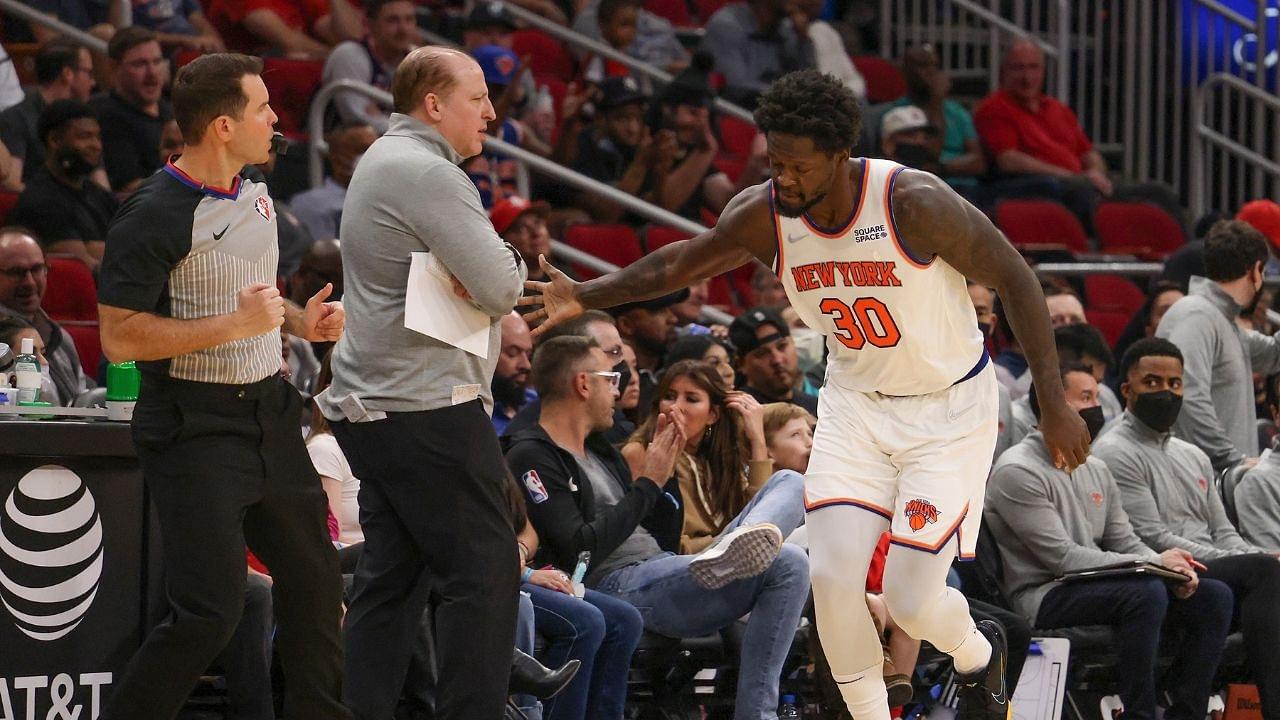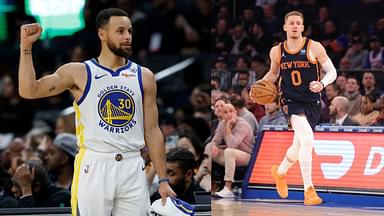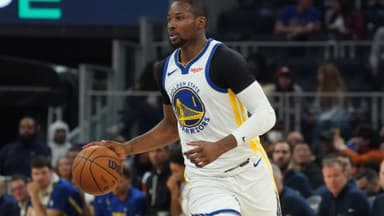An erratic and inconsistent performance by Julius Randle this season has left the Knicks’ fanbase frustrated with their star and the NBA’s reigning Most Improved Player. Can the player and team find the formula for success for a second-half surge this season?
Advertisement
Karan Madhok / @KaranMadhok1
A hundred voters cast their ballots for last season’s Most Improved Player award.
98 of them handed their first-place votes to Julius Randle.
It was a thunderous result, and a well-deserved honor for one of the true rising stars in the league. After a few years in the league as a solid, if unspectacular contributor, Randle’s performance in the 2021-22 season—his second in New York—was truly special.
The forward improved across the board, posting career highs in his seventh NBA year, including in scoring (24.1 ppg), rebounds (10.2 rpg), assists (6.0 apg), three-point shooting (.411), free throw shooting, and steals.
All this came on the back of Randle becoming the sure-shot top offensive option for the Knicks, also playing a career-high 37.6 minutes per game under coach Tom Thibodeau. He became a deserved All Star, and more impressively, was named to the All NBA Second Team.
This drastic rise in production and efficiency were more than an individual highlight; Randle’s improvement also paralleled that of his team. As the Knicks’ leading scorer, rebounder, assister, and logging the most minutes per game, Randle was truly front and center as the team rose from being a bottom-feeder to 4th place in the East by the end of the season, even securing home court in First Round of the playoffs.
The playoffs, however, were a completely different story. Randle struggled to carry the Knicks with all the increased attention from the opposing defense. His shooting numbers fell dismally below 30 percent, and he could only average 18 points per contest in the Knicks’ 4-1 series loss to the Atlanta Hawks.
Nevertheless, Randle’s Most Improved season left a strong impression. The Knicks suddenly had an All-Star on their roster, the type of player that they could finally build around for the long-term, the type of rising star that could convince other stars to consider donning the blue, white, and orange, too.
Before the beginning of the most recent season, management duly rewarded Randle for his breakout year, handing him a four-year, $117 million dollar extension to stay with the team.
Alas, ever since then, the ghosts of the 2021 playoffs have seemingly continued to haunt Randle. Gone is the uber-efficient, uber-dominant forward who could go toe-to-toe with the biggest stars in the league on any given night. Gone is the player who had become a fan favorite in New York City—a city that also featured the Brooklyn Nets and their three-headed dragon of Kevin Durant, James Harden, and Kyrie Irving. Gone was the leader that led the Knicks to become the league’s Cinderella Story.
Randle’s 2021-22 season has been erratic, to put it kindly. In 38 games for the Knicks so far, he is averaging 19.5 points on 41.9 percent shooting from the field—both his scoring and efficiency down dramatically. After last season’s wondrous three-point shooting (41.1 percent), Randle’s accuracy from deep has also fallen to 31.6 percent.
Many Knicks fans hoped that last season was the sign of Randle turning a corner, of a new accelerated ascendence of his career. Instead, it seems now like last season was an aberration, and the Randle who suits up for the team now is the real Randle: an important player still, but nowhere near the All NBA heights he has recently tasted.
As his production has suffered, so have, in parallel reaction, the Knicks as a whole. The team currently stands at 19-21, not quite following up the expectations of last season’s fourth-place flourish. In many cases around the league, a team can only go as far as their best player carries them; like Randle, the Knicks too are dealing with the sobering reality that they may be, at best, middling with averageness.
The New York fanbase can be notoriously passionate, adoring the players who show true effort, but quickly criticizing those who leave a half-hearted effort. As his on-court performance suffered, so has his relationship with some fans and the media—and Randle let it be known that he had heard, and ignored, all the recent criticism. “I really don’t give a shit,” he said in a recent interview. “I just go out there and play.”
Matters got even more heated this week in the Knicks emotional win over the Boston Celtics, where the team bounced back to win from 25-down on the back of Evan Fournier’s career night and RJ Barrett’s wild game-winner.
As the Knicks trailed big in the first half of this game, Randle heard the boos from the home crowd. His response was a thumbs down symbol to the Garden faithful, which he later explained was a message for the fans to “shut the fuck up” (he was fined a day later).
Randle followed his first-half struggle with a strong third quarter which contributed to the Knicks comeback, and some big rebounds and hustle plays in the fourth. He finished with 22 points on 40 percent shooting; a decent going, but with fan expectations raised considerably from last season, still leaving a lot more to be desired.
In the rematch with the Celtics just two days later—a 24-point blowout loss where the Knicks could only muster a season-low 75 points—Randle again dropped a dud, finishing with just 13 points on 6-19 shooting.
Winning changes everything, and few fans will worry about the details of Randle’s falling percentages or efficiency if the Knicks can go on a run in the second half of the season. Randle’s role in turning the team from a minnow to having playoff ambitions is highly commendable.
But the Knicks now need a bigger surge towards securing a postseason spot. With a number of strong contending teams in the East, nothing is guaranteed. The Knicks’ fanbase, however, cannot be blamed for their dissatisfaction with Randle, if the effort and body language of the team’s best player continues to be frustratingly inconsistent.
For Randle, to “just go there and play” is simply not good enough. He needs to just go out there—and win.
Big Questions from Around the NBA
– The Boston Celtics feature two of the most dynamic young players in the NBA—Jayson Tatum and Jaylen Brown. Both players theoretically have the perfect toolkit to dominate in today’s NBA: they are swingmen with size, versatility, shooting, perimeter offense, and perimeter defense. Both these young stars are 25 or under, and their future promises to be even brighter than their past. What, then, is Boston’s excuse for their struggles this season, a 19-21 record good enough only for 10th place in the East?
Internal drama has been made public in Boston over the past two months, and it seems clear that, despite their individual talents, Jayson and Jaylen are not quite the type of leaders who fit together, and/or, make their teammates better in a consistent way. Will the Celtics overreact and make a trade, breaking up one of the league’s best young partnerships?
– The last time Klay Thompson played professional NBA basketball, it was June 2019, the 2019 NBA Finals, where he scored a scintillating 30 points on just 12 shots before leaving with a torn ACL injury. Thompson’s ACL was then followed with more tragedy, a ruptured Achilles before the beginning of the next season. Now, 31 months (!!!) since his last game, Thompson returned to action.
He will suit up for a Golden State Warriors squad that has been one of the league’s most formidable, featuring Thompson’s ‘Splash Brother’ backcourt mate Stephen Curry who has been rampaging on his way to another MVP-contender season. How good will a rusty Thompson be? And how much better can the Warriors get with him?
– Kyrie Irving, unvaccinated, has returned to action for the Brooklyn Nets. But, because of the city mandates, he ironically can’t play home games for his own squad, suiting up only in cities that allow non-vaccinated gatherings. It is a strange situation for a team that has title hopes and feature a couple of other superstars—Kevin Durant and James Harden—hoping to end this season in a flourish. Will Irving’s on-again/off-again return to the lineup be a gift—or a distraction?







